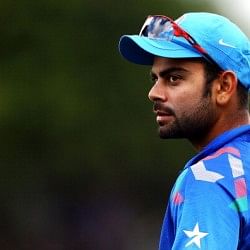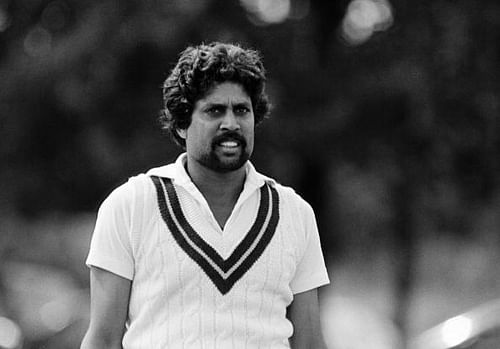
Asia Cup 2014: India's top captains and what Virat Kohli can learn from them

Virat Kohli is under tremendous expectations
India’s laboured overseas trips have finally come to a close and the safe-haven of the sub-continent calls as the Asia Cup begins on 25th February. Virat Kohli will step into the shoes of MS Dhoni once again but it will be a little more than an experiment this time around. The recent losses in South Africa and New Zealand compounded the pain of the catastrophic losses that India had suffered in Australia and England.
Dhoni’s ability to lead the side in alien conditions has been questioned vociferously this time around. Ex-Indian captains including Rahul Dravid and Sourav Ganguly have criticized Dhoni’s defensive tactics and Ian Chappell ridiculed Dhoni in no mild words when he said, “…as a Test captain he’s too reactive and has a tendency to let the game meander along, like an absent-minded professor strolling in the park.”
While such an assessment may be too harsh, we cannot deny that Dhoni’s epoch will come to an end with the 2015 World Cup and there is a need to look beyond him.
Asia Cup will be a true test of character for Virat Kohli. The competition brings with it a massive set of expectations. Indian fans are in urgent need of a lift as the wounds suffered against New Zealand and South Africa need some healing. The tournament brings with it the crucial contest against arch-rivals Pakistan which is always keenly watched and draws extreme emotions.
The tournament is also a teaser to the World T20 that will ensue soon after in Bangladesh. Kohli offers a new style of leadership. He has a refreshing, exciting but vulnerable personality and the same will find expression in his captaincy which makes for an intriguing scenario.
This article will attempt to look at India’s outstanding leaders of the past 25 years: the period that has seen the emergence of the ODI format. It will take a look back at how they expressed their personalities on the field, the performances that they drew from their respective sides and what Kohli can draw from each figure. We begin chronologically from 1983 when India broke through their shell to announce themselves on the world stage with that unforgettable triumph at the World Cup:
Kapil Dev
India’s greatest all-rounder, dubbed the Haryana Hurricane, was perhaps the most charismatic leader in the glorious history of Indian cricket. There was a rare combination of simplicity and flair in the person of Kapil Dev. He still remains a unique commodity in the Indian archive simply on the merit of his cricketing skills: a fast bowling all-rounder whose exploits are shadowed by his more celebrated contemporaries such as Ian Botham, Imran Khan and Richard Hadlee.
Kapil Dev took the reins of the side when the team was searching for an identity and he gave it one. Many emphasize the fact that India triumphed over a world-class West Indian side defending a meagre total and slip in a casual remark about the luck of it all. The fact, however, is that India had defeated West Indies earlier in the same tournament and convincingly so. The win, more than anything else, emphasized the value and worth of spirit against the power and prestige of reputation.

Kapil Dev changed Indian cricket forever in 1983
We can perhaps pick innumerable moments that defined a long and glorious career. However, that critical knock of 175 against Zimbabwe stands out and one wonders whether that changed the course of Indian cricket. This was an example of fighting with your back against the wall if there ever was one.
India were dwindling at 17 for 5 when Kapil decided to knock the stuffing out of the opposition with counter-attacking cricket. The unexpected victory lifted the team so that India registered a massive 118 run win in the next game spurred on by 4-wicket hauls for Roger Binny and Madan Lal as the team started to come into its own. This is the stuff great leaders are made of. They stand up in times of desperation and they re-fuel the side, extract the most from a player’s potential.
Virat Kohli can take so much from this exemplary legend of Indian cricket. He had that x-factor that allowed him to intervene in situations when India were losing their way and his all-round abilities allowed him to do that. That magical and unforgettable catch in the 1983 World Cup final is another example of this X-factor.
Kapil Dev took great pride in playing for India and leading India and put the nation of the cricketing map. Kohli’s agenda must be to maintain India’s supremacy in the limited overs format keeping in mind fostering in his heart the same passion for national glory.
Mohammad Azharuddin
The tragic fate of Hansie Cronje was exaggerated into a legend by his early death but few sincerely mourn the scarred career of Md. Azharuddin who captained India through the 90s. Those who had the pleasure and honour of watching Azhar bat at his peak know that he was sculptor among paltry woodcutters. The magical wrists, the delicate handwork concealed the few technical flaws of his batsmanship. Azhar had announced himself in the Test arena with three consecutive Test centuries but his batting took a back-seat when he took over the leadership role.
Azhar exuded a sense of lazy comfort when he batted or as he stood with up-standing collars in the covers but it was a kind of deception that he practised. His hands were magically quick and his fielding was agricultural but effective. He practised the same kind of deception in his leadership as he lead India through a number of important home wins in the Test format at a time when we were still a cricketing nation of limited talents.
The pitches were made to order and Indian spinners made best use of it and the strategy worked for India. Azhar led a convincing campaign in 1996 but it wasn’t to be as India fell at the semi-finals hurdle to eventual champions Sri Lanka. The high-point of that campaign was India’s victory over a powerful Pakistan side in the quarter-finals.
Azharuddin seems to be a figure from a distant and buried past that belies the actual historic distance which is not so much. Kohli can derive from Azhar’s epoch the ability to utilize resources so as to maximize results. Kohli can also learn the obvious lesson of what not to do from the tragic legacy of Md. Azharuddin.